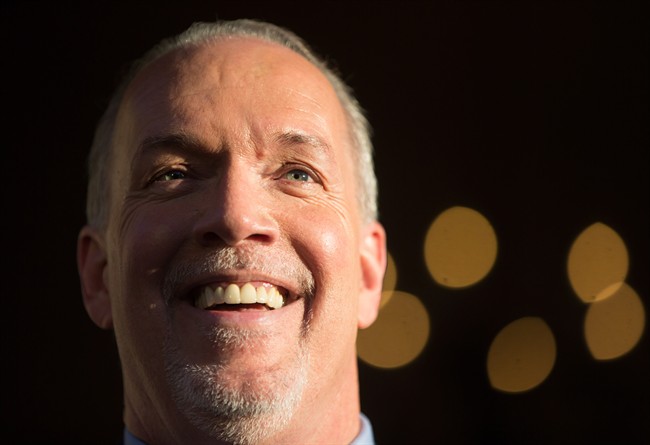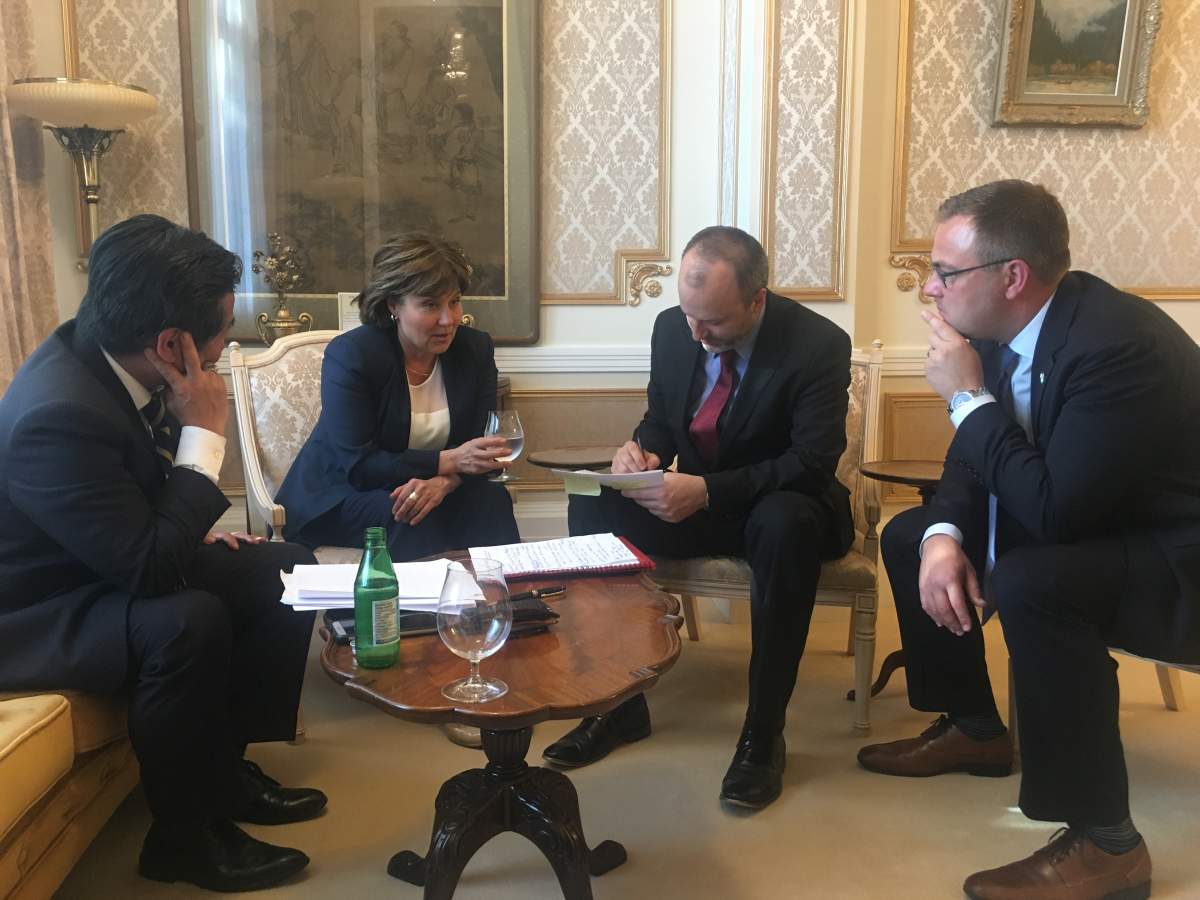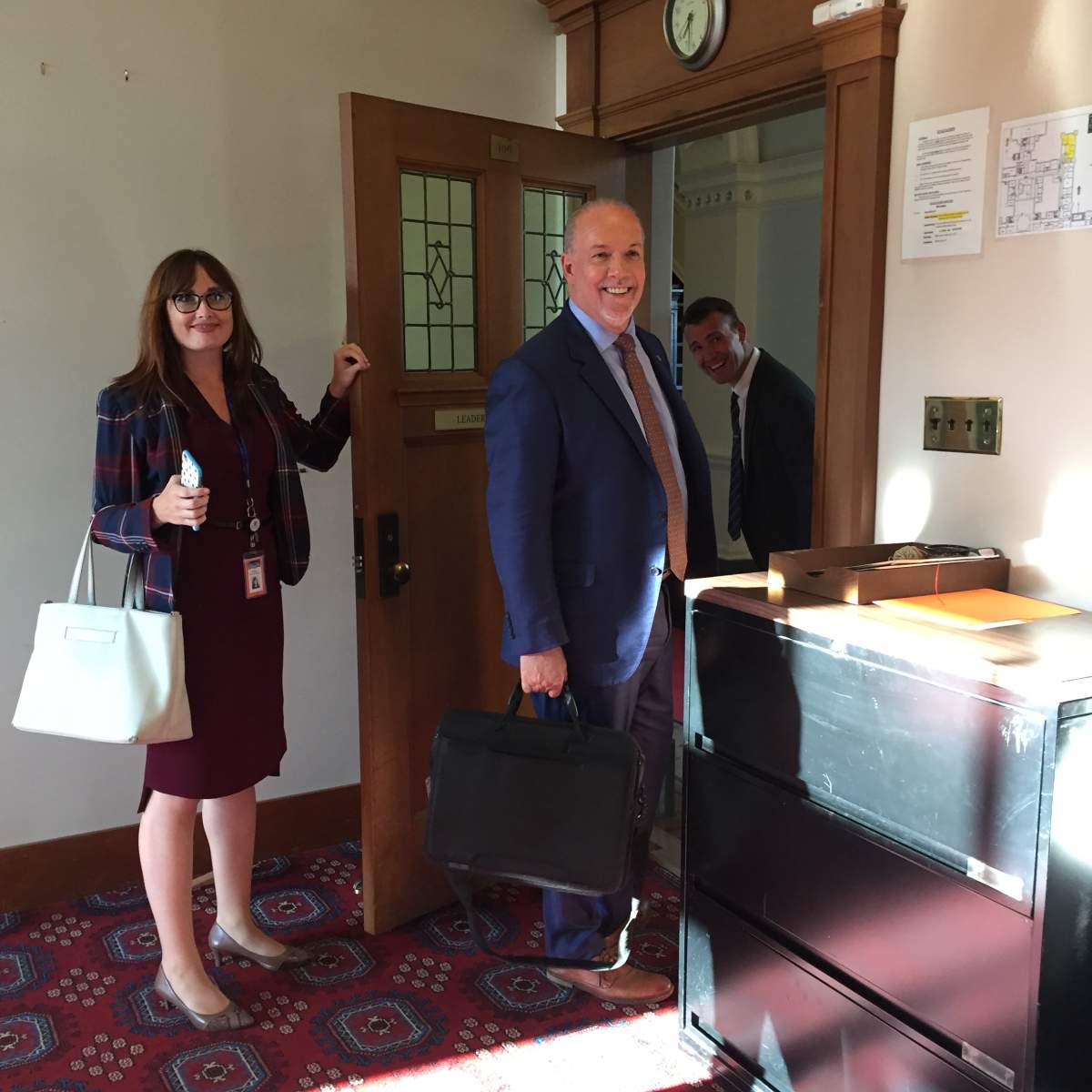The confidence vote that toppled Christy Clark’s government on June 29, 2017, was one of the most extraordinary evenings in B.C.’s political history. As the province waited, Lt.-Gov. Judith Guichon deliberated behind closed doors on whether B.C. should plunge into a new election, or John Horgan should get a chance to govern. The inside story of what happened at Government House has not been told, until now. In a new book, A Matter of Confidence: The Inside Story of the Political Battle for B.C., Vancouver Sun columnist Rob Shaw and Global BC reporter Richard Zussman pull back the curtain not only on that evening, but the remarkable story of Clark’s rise and fall, and the backstory of Horgan’s path to the premier’s office.

• • •
Premier Christy Clark walked slowly across the cream-coloured carpet of the French drawing room in Government House, and collapsed heavily into a white chair in the corner. She sighed, exhausted, as her staff gathered around her. The normally chipper premier no longer bore the permanent smile that was her trademark.
“I don’t think she’s going to do it,” said Clark.
The premier had just emerged from a meeting with Lieutenant-Governor Judith Guichon. Her last hope to stay in power rested on Guichon agreeing to her request to dissolve parliament and call a new election.
The meeting, though lengthy, had not gone well. Clark was exceptionally skilled at reading people, a technique she’d deployed constantly during her lengthy political career. She could tell the moment she’d walked into the room that Guichon had already made up her mind. The lieutenant-governor appeared both uncomfortable and defensive. The premier nonetheless gave it her best pitch. She started by handing over an envelope containing her resignation letter, a formal step that was required after an alliance of BC NDP and Green MLAs had voted down her Liberal government on a confidence vote just two hours earlier.
WATCH HERE: BC Liberal government defeated in confidence vote

“Here’s my letter of resignation and here’s my advice to you,” began Clark. “You should dissolve the legislature, because no party can govern in there. The only way a party can govern is by perverting the rules of our democracy. And you have a responsibility, as I do, to protect those democratic principles. That’s what the lieutenant-governor is appointed to do, is to safeguard democratic process. That’s your job. And my advice to you is, in order to be able to do your job, dissolve the legislature or these principles will be violated.”
Clark cited several important things, like how an NDP government backed by the Greens would require the non-partisan Speaker to break almost all the tie votes, and how the NDP had strongly hinted publicly that they’d stack legislature committees to give themselves more seats than were reflected in the makeup of the House.
But Clark got nowhere.
She handed the lieutenant-governor a two- or three-page written analysis of the unworkability of the legislature, partially penned by her house leader, lawyer, and twenty-three-year veteran MLA Mike de Jong. But Guichon simply took it and put it aside without even reading it.
READ MORE: June 30, 2017 — A government falls and a new one is set to rise in British Columbia
At times, it didn’t even look like the vice-regal representative was listening. There were no questions during Clark’s early statement. She’d finish a particular point and be greeted by a silence that settled between the two of them, each seated on red leather chairs in the lieutenant-governor’s private study.
The premier and the lieutenant-governor decided to have a glass of wine — a BC pinot gris. Clark wanted to keep Guichon talking. For almost forty minutes, the premier alternated between small talk with the Nicola Valley rancher whom she’d known personally for years, and pulling her back to the issue at hand. Clark felt she needed to make every effort to persuade Guichon to change her mind. Even though it looked like she had long since decided that an election was off the table, Clark pushed to change the unchangeable. Guichon was uncomfortable with the approach, which Clark recognized and exploited to pressure her further. Occasionally she could briefly draw her into the debate, like when she argued it was the lieutenant-governor’s job to safeguard the democratic process, and Guichon would reply that no, that was the official Opposition’s job, and the media’s.
Clark tried to argue that there was history and precedent in the lieutenant-governor being required to act on her first minister’s request for an election. Here too, though, Guichon refused to engage. Clark got the impression that the Nicola Valley rancher hadn’t made up her own mind; she’d been told by advisors what to do and was unwilling or unable to defend it when pressed. She was just repeating what she’d been told.

Get daily National news
After almost three-quarters of an hour, Clark gave up. It seemed hopeless. Guichon wasn’t willing to budge. They concluded the meeting. Guichon wouldn’t tell her what her decision was going to be. That was the worst sign of all, because had Guichon accepted her advice on calling an election, Clark would have been told and then gone outside to inform the public.
Clark knew all the signs were bad as she walked back down the red-carpeted hallway of the Government House mansion to the French drawing room, where four of her senior staff were waiting for her.
“I think she’d made up her mind before I got there,” Clark told them. “And I think she’s going to call on John Horgan.”
• • •
Back at the legislature, huddled around a television inside (chief of staff Mike) McDonald’s office, half a dozen of Clark’s senior staff watched the premier leave Government House. The office is a modest room next to the premier’s expansive suite, just a short walk down the hallway in the legislature’s west annex.
Hamish sat alone in his mom’s office, with its view of the legislature’s front lawn. It was the best political real estate in BC, but a lonely spot for a teenager to hold a silent vigil for his mother. Eventually, recognizing he was stressed and hungry, staffers went out to get him a pizza.
The prevailing theory was that the lieutenant-governor would now consult with constitutional scholars and begin a detailed study of the issue. Visions of leather-bound ancient texts, full of convention and constitutional rules, were conjured up. It was the wrong read of the situation.
Clark arrived back in her legislature office roughly ten minutes later. During the ride, her normally effervescent mood had been subdued, and she seemed down. She could read the writing on the wall.
Her staff leaned out of McDonald’s office to watch her walk in. Clark offered merely a shrug of her shoulders. She went into her office, where someone had added sushi to the menu with the pizza, and ate dinner with her son. Everyone mostly left her alone, though Mike de Jong arrived for a debrief.
READ MORE: June 30, 2017 — B.C. will have its first NDP government in 16 years. But is it inherently unstable?
In a different room at the legislature — within throwing distance if you had a good arm — John Horgan and his staff were nervously waiting to see if they’d get a call.
Around ten people were in chief of staff Bob Dewar’s office, also watching television coverage of the developments at Government House. Horgan paced in and out of the room with his lacrosse stick, hurling a soft stress ball against the wall of his adjoining office and catching it, again and again. The longer Clark was inside, the more confused and worried the group became. They thought Guichon had made up her mind, so why would she be speaking with Clark for more than an hour?
It didn’t seem likely to them, or to others even in the Liberal camp, that Horgan would be asked up to Government House simply to be quizzed by Guichon on his intentions, or to have the news of a new election broken to him personally. No, once that phone rang, Horgan was as good as premier.
But to add to the New Democrats’ confusion, Clark told the media following her meeting that the lieutenant-governor had “retired to make her decision.”
Dewar took out his phone and started to compose a text message to (Jerymy) Brownridge (Guichon’s private secretary). He wanted to know what Clark meant when she said Guichon had retired for the evening. As he did, his phone rang in his hand.
“Bob,” said Brownridge. “This is your million-dollar call.”
“Really?” asked Dewar.
“Yeah. Can you come right over?”
“We’ll be right over.”
Dewar grabbed his bag. “Let’s go,” he said to Horgan.
The man who was about to become premier-designate now wore the weird smile of a man who wasn’t sure this was really happening. As he grabbed his belongings and prepared to leave, he started hugging everyone he could see.
Press secretary Sheena McConnell’s husband, Liam, brought the car around.
Horgan called Weaver.
“Andrew, I just got the call,” he said. “Just letting you know I’m headed to the lieutenant-governor’s office.”
Weaver congratulated him and expressed confidence the lieutenant-governor would make the right decision. As they were talking, Horgan emerged from the library entrance of the legislature, where Weaver’s ground- floor windows were. The Green leader threw open a window and yelled, “Good luck!” as Horgan rushed by.
It was a long drive for Horgan and crew, even though it was really only ten minutes. They made small talk to cut the tension. Dewar wanted to know why the trip was taking so long. Isn’t Government House, like, a block away from the legislature, the Manitoban asked. Not in British Columbia.
Horgan was a bundle of nervous excitement, but his instincts on that long drive led him to believe the lieutenant-governor was in his corner.
“I know she’s going to ask me to form a government, I just know it. In my bones I can feel it,” he said in an interview for this book.
Horgan, Dewar, and McConnell entered Government House and almost immediately knew it was good news. When Horgan was escorted to see Guichon, Government House officials gave Dewar a copy of a press release they’d prepared announcing Horgan had been asked to form a government. Dewar texted Della Mattia, who was back in his office at the legislature.
“We did it,” was the message. It was 8:01 p.m. Government House wanted the NDP to wait and hand out the paper press release as Horgan exited the building. At 8:08 p.m. Dewar sent out a text anyway, kicking into action the NDP’s digital communications team.
Inside the lieutenant-governor’s office, Horgan and Guichon had a relatively short chat, compared with the forty-five-minute conversation between Clark and Guichon.
Horgan awkwardly broke the ice. “So,” he said. “This is interesting.”
“Yes, it’s been quite an experience,” said Guichon. “I have two questions for you. Do you have the confidence of the House?”
“I believe I do,” responded Horgan.
A photo taken at that moment shows Guichon leaning back casually with her legs crossed in one red-leather chair, while Horgan sits in another, literally on the edge of his seat, leaning forward, his arms resting on his knees, smiling.
“Can you form a government?” asked Guichon.
“Yes,” said Horgan.
“Well, best of luck,” concluded Guichon.
READ MORE: John Horgan sworn in as B.C. premier, unveils new cabinet
With that, Guichon’s private secretary, Brownridge, excused himself from the room to start preparations for announcing the new government. Guichon and Horgan would make small talk for a few more minutes, with the lieutenant-governor explaining she’d talked to experts and the only recourse when the province had just had an election was to give Horgan a chance.
Horgan emerged from the meeting as premier-designate. He met his staff in the French drawing room, where Brownridge introduced him to his staff, saying, “And here’s your premier.”
Horgan gave them all big bear hugs. “This is the moment we’ve been waiting for,” said Dewar, after the embrace.
“Wow,” replied Horgan, smiling.
Horgan went to call his wife Ellie, but he didn’t have his phone. He used McConnell’s iPhone, but Ellie, who was at home in Langford, didn’t recognize the number and didn’t pick up. Horgan had to leave a message.
“Hey Elle, it’s me, the premier, calling,” Horgan left on the machine. “I’ll see ya soon.”
WATCH HERE: NDP’s next steps

The public was waiting to see what would happen next. Networks carried live shots of the front doors, waiting for any movement. The first announcement of a new NDP government came in a fittingly modern form: a tweet from Horgan’s account.
“Today British Columbians finally have the change they voted for,” it said. “Thank you to everyone who got us here. The hard work starts now.”
The tweet was quickly followed by an email to NDP supporters from the new premier-designate, saying Guichon had asked him to form a government. Outside, the small crowd that had gathered on the Government House driveway broke into applause and cheers.

Back at the legislature, Clark’s press secretary, Smart, saw the tweet. He dashed to Clark’s office, where she was still talking to de Jong about the conversation with the lieutenant-governor.
“Premier, I’m really sorry to be the one to tell you this, but I should read you this tweet that John Horgan put out,” Smart said.
As he read out Horgan’s message, he watched his boss physically deflating with the words.
“Okay,” she said simply.
Smart left, and Clark and de Jong had a moment alone, sitting in the chairs beside the window overlooking the legislature lawn.
“Well, it’s over,” the fallen premier said.
And then she started talking about resigning. Other staff, like Chin, began trickling into the room.
“I should just do it now and get it out of the way,” she said, of quitting.
“Premier, tonight is not the night for you to make such a decision,” replied Chin.
De Jong was more direct. “You’re not going to resign tonight,” he said.
De Jong argued that the evening belonged to Horgan, and after all the work she’d put into her party she should wait for her own moment to announce, in a more dignified way, that she was through. Eventually, Clark agreed.
A Matter of Confidence: The Inside Story of the Political Battle for BC by Rob Shaw and Richard Zussman (Heritage House, heritagehouse.ca, $22.95) is available March 17 where fine books are sold.
The authors will hold a Vancouver launch of their book on April 4, 6-7:30 p.m. at SFU Vancouver, 515 West Hastings St. Event details and free reserve tickets at: sfu.ca/events














Comments
Want to discuss? Please read our Commenting Policy first.